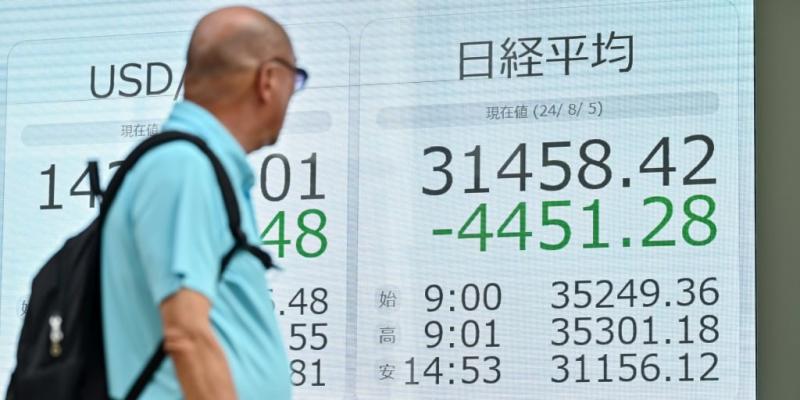Japan stocks rebound as much as 10% after historic losses; other Asia markets also recover
Category: News & Politics
Via: perrie-halpern • 9 months ago • 14 commentsBy: CNBCBy Lim Hui Jie, CNBC and Dylan Butts, CNBC



Japan stocks rebounded sharply on Tuesday after the Nikkei 225 and the Topix dropped over 12% in the previous session. Other Asia-Pacific markets also opened higher.
Japan's Nikkei 225 — which saw its largest loss in the previous session since the 1987 Black Monday crash — and the broad-based Topix gained as much as 10% before paring gains to 8%.
The Bank of Japan raising rates to their highest level since 2008 on July 30 caused the yen to strengthen to a seven-month high, pressurizing stocks.
Markets globally were also spooked by fears of a U.S. recession stoked by a weaker-than-expected jobs report.
Japan's heavyweight trading houses all saw rebounds of over 8%, with Marubeni up over 13%. Softbank Group Corp jumped almost 10%.
The yen weakened over 0.62% to trade at 145.07 against the U.S. dollar.
South Korea's Kospi jumped above 3%, while the small-cap Kosdaq was up more than 4.5%. The South Korean markets were halted temporarily on Monday after they fell 8%, triggering circuit breakers.
South Korean heavyweight Samsung Electronics rose 2.1%, while chipmaker SK Hynix climbed 4.5%.
Mainland China's CSI 300 opened flat, while Hong Kong's Hang Seng index rose 1.03%.
Australia's S&P/ASX 200 opened up 0.27%.
Oil prices also rose with Brent crude climbing 1.65% to trade at $77.56 per barrel. U.S. West Texas Intermediate crude rose 1.86% to trade at $74.30.
Japan's June household spending numbers showed a larger-than-expected fall year over year, dropping 1.4% in real terms. The average monthly income per household was up 3.1% in real terms from the previous year.
Real wages in Japan also grew 1.1% in June compared with a year ago, the first time that wages have risen in 26 months. Strong wage growth offers more room for the Bank of Japan to tighten its monetary policy.
The Reserve Bank of Australia will release its cash rate later Tuesday, with economists expecting it to remain steady at 4.35%.
Overnight in the U.S., the 30-stock Dow and the S&P 500 notched their worst sessions since September 2022.
The Dow dropped 1,033.99 points to end 2.6% lower, while the S&P 500 slid 3%. The Nasdaq Composite shed 3.43%, ending 15% off its closing high.



Yesterday was all gloom and doom... today it's supposed to not be so bad. The markets are structured to bubble and burst.
[deleted][✘]
Meh, inane questions get what they deserve ... inane answers.
This article by NBC news is meant to dilute the cold hard truth of a pending recession.
The US economy is leading the world post-Covid. A rate cut is next. There will be no recession, like you predicted the last three years...
Ok, you are on record.
We are so overdue for a recession, I would not make any such predictions if I were you. A recession is a normal cycle, it averages to hitting every 6.5 years since World War II.
What is a Recession? 10 Facts You Need to Know | Kiplinger
The last recession was The Covid-19 Recession of Feb 2020 but that recession only lasted two months. Yes the markets and economy recovered strongly until early 2022, but the inflation caused by the government overspending caused the Fed to raise interest rates which increase recession risks.
It's way too early to state there will be no recession as the last recession IMO was more artificial due to the lockdown and disruptions caused by Covid. Time will tell how "big" the next recession will be, but it's an easy guess that 'Yes Virginia, there will be another recession'.
This was put out by CNBC which has its own editorial staff, and it is just stating a fact.
There have been cries about an impending recession for 4 years now, yet the markets are up, and employment is too hot, which is why the Reserve didn't lower interest rates. The hope is that they will now.
Personally I hope they resist the crying for an emergency fed meeting to lower rates now and wait for their next meeting in September. It they do an emergency meeting based on one day the cry of politics will be heard everywhere.
and that will almost certainly trigger a recession. Happens every time. All it takes is businesses to tighten their belts and people start to believe it and cut back on spending and the whole cycle starts.
Yesterday's sell off was more a knee jerk reaction to the lack of easy loan money than anything else. Employment is slowing which is triggering fears of a soft recession, but it's exactly what the Fed wants to lower interest rates. Spending has been the biggest driver of keeping the economy from sliding into recession.
Economies also have seasons and both you and I have been through at least a baker's dozen of recessions since the end of WWII. Don't be so gloomy, the Gods detest trite reactions and will cause a sky full of locusts to fall and we will all be fucked when the government entomologists Patriot Game the government meteorologists.